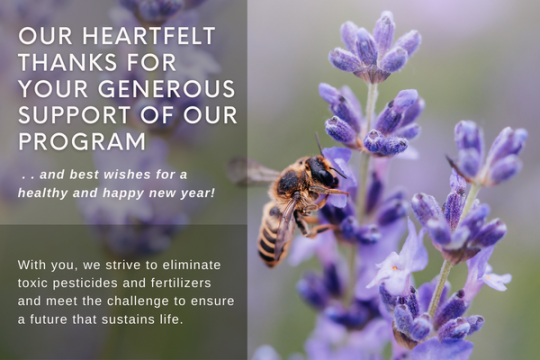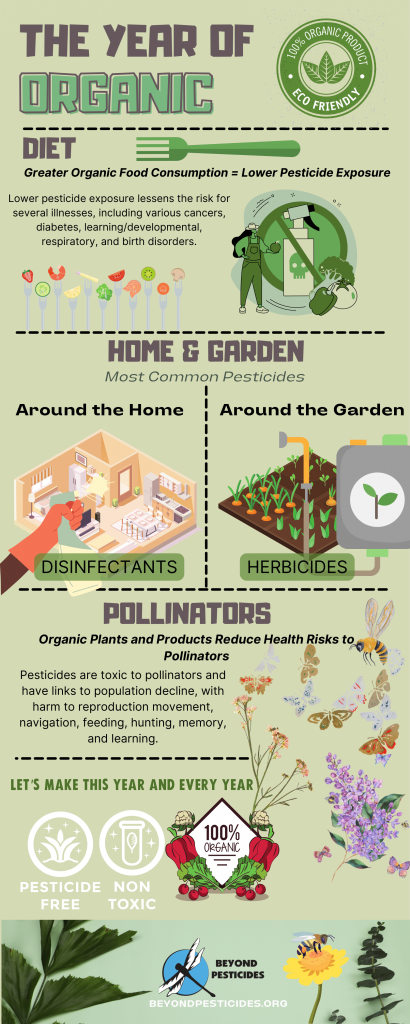23
Dec
Moving to A Future in Sync with Nature—Healthy and Happy Holiday Season and New Year

(Beyond Pesticides, December 23, 2022—January 3, 2023) To all those who read Beyond Pesticides Daily News or take action with us through our Action of the Week, a healthy and happy holiday season and new year. The Beyond Pesticides staff will be taking a weeklong break to gather with family and friends and renew our spirits as we plan to elevate our voice for change in the new year. As a reader of these pages, you know that Beyond Pesticides puts major effort into tracking the science on pesticides—their health and environmental effects—as well as alternatives to chemical-intensive management with our heavy emphasis on the organic alternative.
Our dedication to making science accessible to laypeople stems from our belief and experience that we are all effective advocates with our families, friends, school districts, parks departments, and the business community reliant on pesticides when we have access to the information necessary to make informed decisions. With this information, we are unrestrained to challenge decisions that are harmful to our families and communities, including our environment, and capable of advancing solutions that support a future that sustains life. And when it comes to alternatives, we are heavily invested in the organic alternative and continuous improvement of standards for organic land management. We helped to develop organic standards three decades ago and now work to ensure organic integrity that is central to organic food certification at the same time as we incorporate these rigorous soil-based standards in our Parks for a Sustainable Future program. We advance a transformation in our culture, policy, and practices that embraces the critical value of living in sync with nature. Our experience with the organic alternative teaches us that it works, both effectively and economically.
 As we move into 2023, we are super encouraged to take our institutional knowledge and experience and work with communities across the country to adopt organic management of all their public lands—as they teach residents about value of organic in mitigating the current day existential crises related to health, biodiversity, and climate.
As we move into 2023, we are super encouraged to take our institutional knowledge and experience and work with communities across the country to adopt organic management of all their public lands—as they teach residents about value of organic in mitigating the current day existential crises related to health, biodiversity, and climate.
Our annual report for 2021-22, Collaborating with Communities: To meet the challenge for urgent change (posted on our website), offers our perspective in more detail.
Beyond Pesticides’ program offers a bright spot amidst urgent challenges that threaten the health of people and ecosystems in the U.S. and worldwide. While the scientific literature defines existential threats to public health, biodiversity, and climate associated with petrochemical pesticides and fertilizers, Beyond Pesticides charts a protective path forward. We are successfully partnering with communities nationwide and around the globe to urgently effect a shift to organic practices that eliminate the use of toxic pesticides. As we work to adopt community-based models for transitioning to organic systems, we move local, state, and national debate from individual bad actor chemicals to a holistic and transformational strategy that, through policy and practice, manages land and buildings without toxic chemicals.
In our strategic work—whether with professionals or laypeople, local elected officials or concerned advocates—we play a critical role in enhancing public understanding of the science and the practical hands-on expertise to inform the urgent steps that must be taken. In this context, our strategies are informed by a recognition that with the escalating grave threats there is disproportionate risk to people of color communities and those with health vulnerabilities. At the same time, the chemical industry, and chemical-intensive agriculture and landscape sector, are fiercely fighting to retain the status quo and protect their vested economic interests.
To achieve the changes necessary for a livable future, we maintain a rigorous program at the intersection of science and advocacy. Our tracking of the scientific literature provides the factual basis for action—made accessible to nonscientists, including government officials, through our Daily News and numerous, continually updated databases on pesticide hazards and alternatives.
We are expanding our reach, as more people and communities utilize our content-rich website, contact us for information and strategic advice, and engage with our organic transition work. Our expanded Parks for a Sustainable Future program eliminates toxic inputs by evaluating existing community land management practices, providing a soil and landscape management plan, and training land managers. At the same time, we continue to coordinate, through our Keeping Organic Strong program, a national effort to ensure the integrity of certified organic food production standards, which establish the keystone list of organic compatible materials in land management practices that are in sync with nature.
Through our Action of Week, thousands of people take part in timely, strategic action on key issues. We planned our three-part virtual National Forum Series, Health, Biodiversity, and Climate: A Path for a Livable Future, to bring together national and international leaders as we define the seriousness of the existential threats and the viability of organic solutions.
With these programs, we are growing an informed and influential network for timely and meaningful change. Thank you for making a difference with your support of Beyond Pesticides! Healthy and Happy New Year!
For even more details on our work in 2022, see A Year in Review for 2022.










